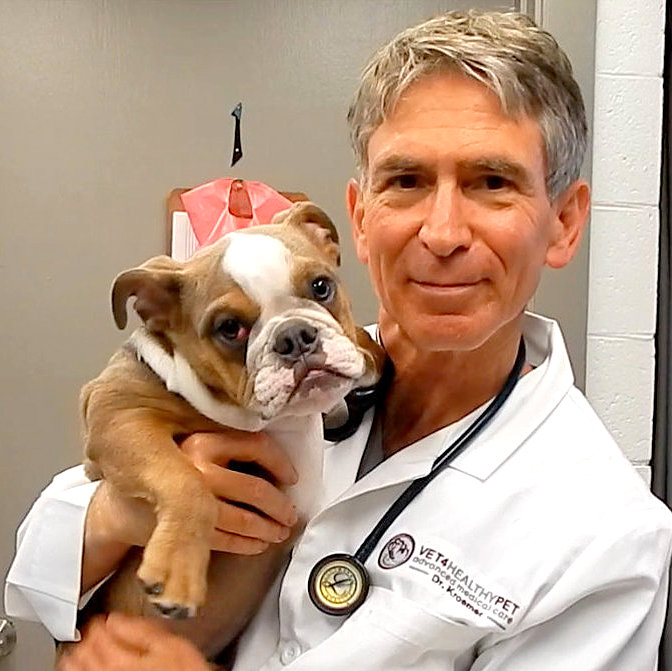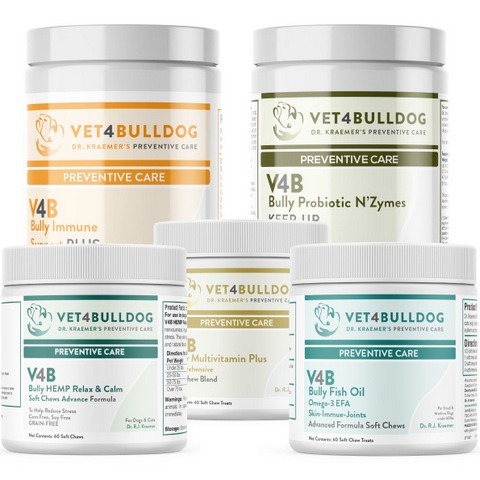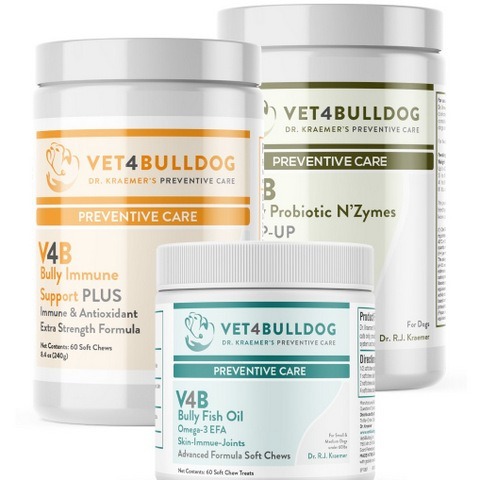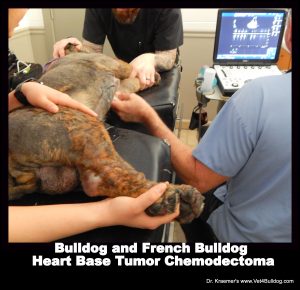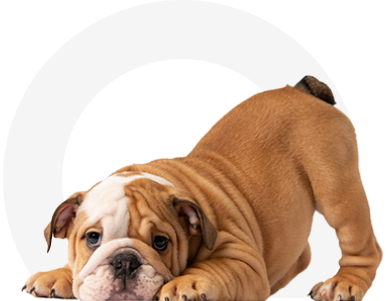Dear Dr. Kraemer, I hope this email finds you well. I’m reaching out concerning my 9-year-old English BulldogBuster❤️, who has developed a small skin mass on his right hind leg. I first noticed it a few days ago, and it doesn’t seem to be causing him any discomfort at the moment, but given its sudden appearance, I’m quite concerned.
I read that mast cell tumors can present like this, should they be removed or tested? 🚩 Thanks, Proud Parent of Buster 🙏
Mast cells are crucial components of your bulldog’s immune system, playing significant roles in both allergic reactions and the defense against pathogens. These cells are integral to the body’s initial defense mechanisms.

MAST CELLS AND HISTAMINE
Mast cells store histamine, which is released during the degranulation process of mast cells.
Histamine is primarily recognized for inducing:
- inflammation
- itching
- redness
- hives
- swelling
MAST CELL TUMORS AND SKIN
Mast cell tumors (MCTs) in dogs are a form of cancer that involves the uncontrolled proliferation of mast cells. MCTs are frequently observed on the skin, representing the most prevalent form of skin tumor.
Other less common locations are :
- gastric
- bone marrow
- spleen
- liver
Bulldog Mast Cell Tumor (MCT) 5 X MUST KNOW
- MCT is mostly a skin tumor of older bulldogs
- In its benign early stage, it can present as a pea-sized, curable benign bump
- Late-stage MCT is very cancerous and carries a poor prognosis, early detection is critical
- Treatment includes excision, chemotherapy, and radiation
- Prevention includes Dr. Kraemer’s MCT Bundles
The Member of this Community Prefer Prevention Over RX
Mast Cell Tumors (MCT) in Bulldogs and French Bulldogs CAUSE:
The origin is mostly unknown but they may have
- Viral origin
- Genetic
- Environmental
Bulldogs that develop mast cell tumors are typically older, although they can occur in dogs of all ages.
Mast Cell Tumors (MCT) in Bulldogs: APPEARANCE
The appearance of mast cell tumors in dogs can indeed be misleading, as they often manifest as small, innocuous, pea-sized bumps on the skin. Alternatively, they can appear as larger, ulcerated growths. This variability in appearance can make them challenging to identify correctly. Given this inconsistency, any raised skin mass, regardless of its size or appearance, should be subject to a professional evaluation.
This precaution is crucial because early detection and diagnosis can significantly impact the effectiveness of treatment and the overall prognosis for dogs with mast cell tumors.
BULLDOG SKIN MCT APPEARANCE:
- Pea-sized raised bump
- Growth
- Ulcerative mass
- Large irregular tumor (can be bleeding necrotic and infected)

BULLDOG GI MCT SYMPTOMS:
- Loss appetite
- Vomiting
- Vomit with blood
- Abdominal pain
- Dark stool (digested blood from gastric ulcers)
Early detection it critical
Bulldog and French Bulldog Mast Cell Tumor GRADING
The grading of bulldog mast cell tumors (MCT) based on biopsy (histopathology) findings is crucial for determining the prognosis and guiding the treatment plan. Here’s a more detailed look into the grading system:
Grade I (Well-differentiated)
- Characteristics: These tumors are in an early phase of growth and are well-differentiated, meaning the mast cells still closely resemble their normal counterparts.
- Behavior: They tend to grow slowly and are less likely to spread (metastasize) to other body parts.
- Prognosis: The prognosis for dogs with Grade I mast cell tumors is generally good, as these tumors are typically benign

Grade II (Moderately Differentiated)
- Characteristics: Grade II tumors are more advanced than Grade I. The cells are moderately differentiated, indicating they show more variation from normal mast cells and a higher degree of abnormality.
- Behavior: These tumors have somewhat unpredictable behavior. They may grow more aggressively and have a higher risk of local recurrence or metastasis compared to Grade I tumors.
- Prognosis: The prognosis for Grade II tumors can vary widely.
Grade III (Poorly Differentiated)
- Characteristics: These are the most aggressive forms of mast cell tumors. The mast cells are poorly differentiated, meaning they bear little resemblance to normal mast cells and exhibit highly abnormal behavior.
- Behavior: Grade III tumors grow rapidly and are highly likely to spread to other parts of the body, including the lymph nodes, liver, spleen, and bone marrow.
- Prognosis: The prognosis for dogs with Grade III mast cell tumors is generally poor, due to the high likelihood of metastasis and the aggressive nature of the tumor.
The grading of mast cell tumors is a key factor in determining the most appropriate treatment approach and in predicting the overall outcome for the dog.
Early detection and treatment are critical for the best possible prognosis
Mast Cell Tumors (MCT) in Bulldogs: DIAGNOSIS
- Cytology: A needle aspirate for cytology: microscopic exam
- Biopsy: for histopathology
- Blood and Urine: General blood panels and urinalysis
- Imaging: looking for a large spleen and liver
- radiographs
- ultrasound
Bulldog Mast Cell Tumor (MCT) PREVENTIVE CARE:
While the exact cause of mast cell tumors in bulldogs is not fully understood, there are steps bulldog owners can take to reduce the risk or manage the condition effectively. Here are some preventive measures and lifestyle factors that may help:

MCT Regular Screening
- Skin Checks: Routinely inspect your bulldog’s skin for any lumps, bumps, or abnormal growths.
Lifestyle Effects on MCT
- Balanced Diet: Provide your bulldog with a balanced and nutritious diet tailored to their specific needs. A diet rich in antioxidants, vitamins, and minerals may help support overall health and potentially boost the immune system.
- Stress Management: Minimize stressors in your bulldog’s environment as much as possible. Stress can weaken the immune system, making the dog more susceptible to various health issues.
- V4B Bulldog StressLess Chew
- V4B Bully HEMP Relax & Calm
- Exercise: Regular exercise helps maintain a healthy weight, promotes circulation, and supports overall well-being. Consult with your veterinarian to establish an appropriate exercise routine for your bulldog.

Bulldog Cancer and Immune Support
- Immune Boosters: immune-boosting supplements or medications that may help support your bulldog’s immune system.
- V4B Bully Immune Boosters
- GI Health: help support gut microbiome
- V4B Bully Probiotics
- Antioxidants: Some antioxidants, such as vitamin E and vitamin C, have been suggested to support immune function and overall health. These can be included in your bulldog’s diet through appropriate food choices or supplements.
- V4B Bully Multivitamin Formula

Mast Cell Tumor in Bulldogs / TREATMENT:
The treatment for mast cell tumors (MCT) is multifaceted and depends on several factors, including
- your bulldog age
- overall health,
- cost of treatment
- location of the tumor,
- tumor grade
Here’s an overview of the main treatment approaches:
MCT SURGICAL EXCISION
- Primary Treatment: For resectable tumors, surgical removal is typically the recommended course of action. Achieving wide and deep margins around the tumor is essential because the tumor cells often extend further into the surrounding tissue than is visible to the naked eye.
- Histopathology: After removal, the tumor should always be sent for histopathological examination. This analysis confirms whether the surgical margins are clear of tumor cells, indicating that the tumor was completely excised.

MCT CHEMOTHERAPY
- Indications: Chemotherapy is considered for dogs with mast cell tumors that have metastasized (spread to other parts of the body) or for tumors with a high potential for metastasis, such as Grade III MCTs.
- Referral to Specialists: Veterinarians often refer patients to veterinary oncologists for chemotherapy treatment.
- Common Drugs: Various chemotherapy drugs are used to treat mast cell tumors in dogs. Common options include:
- prednisone
- palladia
- vinblastine
- lomustine (CCNU)
- cyclophosphamide.


The choice of drugs depends on the individual case, including the dog’s health status and the characteristics of the tumor.
BULLDOG MCT RADIATION THERAPY
- Post-Surgical Treatment: Radiation therapy may be recommended following surgery, particularly if the pathology report indicates that tumor cells were found at the margins of the excised specimen. This suggests that the removal of the tumor might have been incomplete.
- Effectiveness: Radiation can be very effective in treating tumors that were not completely removed surgically, helping to destroy any remaining cancer cells and reduce the risk of recurrence.
CANCER BULLY THERAPEUTIC SUPPLEMENTS:
Supplementation can complement traditional treatment approaches for mast cell tumors in bulldogs. Here’s a closer look at some supplements that may be beneficial:
Immune Support
- Beta-Glucans: These compounds can help stimulate the immune system, potentially aiding the body’s ability to fight off cancerous cells.
- Omega-3 Fatty Acids: Found in fish oil, omega-3 fatty acids have anti-inflammatory properties and may support overall immune function.
- Mushroom Extracts (e.g., Reishi, Turkey Tail): Certain mushrooms have immune-modulating effects and are believed to support the immune system’s ability to recognize and attack cancer cells.
- Bully Fish Oil EFA
- Bully Immune Support

Antioxidants
- Vitamin E: Acts as a potent antioxidant, helping to neutralize free radicals that can damage cells and contribute to cancer development.
- Vitamin C: Another powerful antioxidant that supports immune function and overall health.
- Selenium: Works with other antioxidants to protect cells from damage and support immune health.
- Bully Multivitamin Formula
- Bully Immune & Antioxidants

Vitamins & Minerals
- B-complex vitamins: are essential for cellular metabolism and overall health.
- Zinc: supports immune function and wound healing.
- Magnesium: is important for muscle and nerve function and overall health.
- Bully multivitamin Formula

Probiotics for Gut Health
- Probiotic Supplements: Help maintain a healthy balance of gut bacteria, which is crucial for immune function and overall health. A healthy gut microbiome may also support the immune system’s ability to fight cancer.
- Bully Pre-Probiotics and Digestive enzymes
- Bully Probiotics Extra Strength LOAD UP
Calming Anti-Anxiety Supplements
- L-Theanine: Found in green teL-Theanineine has calming effects and may help reduce anxiety and stress in dogs.
- Chamomile: A natural herb with calming properties, often used to alleviate anxiety and promote relaxation in dogs.
- Bully StressLess
- Bully Hemp Calm & Relax
PRESCRIPTION RX
- Anti gastric ulcer rx
- Pepcid C
- Prilosec
- Antihistamine
- Analgesics and itch control
Mast Cell Tumor in Bulldogs TIPS & WARNINGS:
Below are a few selected MCT types and warnings, courtesy of Dr. Kraemer
MCT SIZE CHANGE TIP:
MCT can fluctuate in size from one day to the next due to degranulation and associated allergic reactions When mast cells degranulate, they release these substances into the surrounding tissue, leading to localized inflammation and swelling. This inflammatory response can cause the tumor to appear larger and more prominent.
Conversely, factors such as the resolution of the allergic reaction or changes in the dog’s immune response may lead to a reduction in inflammation and swelling, resulting in the tumor appearing smaller or less pronounced. These fluctuations in size can sometimes be observed over a short period, with the tumor appearing to change in size from day to day or even within hours.
BULLDOG MST SMALL-SIZE WARNING:
Early-stage Class 1 mast cell tumors (MCTs) are often overlooked or dismissed because of their small size and harmless appearance. These tumors might resemble simple skin bumps or minor lesions, leading to a delay in seeking veterinary care.
It’s crucial to understand that early detection and treatment of MCTs significantly enhance the likelihood of a favorable outcome.
BULLDOG GASTROINTESTINAL MST WARNING:
While skin mast cell tumors (MCTs) are much more common in bulldogs, mast cell tumors can also occur in the gastrointestinal tract, including the stomach. Gastric mast cell tumors are less common but can present significant diagnostic and therapeutic challenges. These tumors can mimic the symptoms of gastric peptic ulcers due to the biological activity of the substances released by the mast cells, most notably histamine.
Histamine can increase gastric acid secretion, leading to ulceration of the gastric lining. This can result in clinical signs that are similar to those seen with peptic ulcers
Recommended by Owners Approved by Bulldogs



